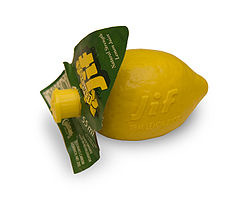.gif)
Jif (lemon juice)
Encyclopedia

Lemon
The lemon is both a small evergreen tree native to Asia, and the tree's ellipsoidal yellow fruit. The fruit is used for culinary and non-culinary purposes throughout the world – primarily for its juice, though the pulp and rind are also used, mainly in cooking and baking...
juice
Juice
Juice is the liquid that is naturally contained in fruit or vegetable tissue.Juice is prepared by mechanically squeezing or macerating fruit or vegetable flesh without the application of heat or solvents. For example, orange juice is the liquid extract of the fruit of the orange tree...
sold in the United Kingdom
United Kingdom
The United Kingdom of Great Britain and Northern IrelandIn the United Kingdom and Dependencies, other languages have been officially recognised as legitimate autochthonous languages under the European Charter for Regional or Minority Languages...
and Ireland
Ireland
Ireland is an island to the northwest of continental Europe. It is the third-largest island in Europe and the twentieth-largest island on Earth...
, by Unilever
Unilever
Unilever is a British-Dutch multinational corporation that owns many of the world's consumer product brands in foods, beverages, cleaning agents and personal care products....
. Noted by some people for its unique plastic lemon containers usually known as "jiffy lemons" or "jif lemons", it is also sold in bottles. A well-known advertising campaign introduced the catch-phrase "Don't forget the pancake
Pancake
A pancake is a thin, flat, round cake prepared from a batter, and cooked on a hot griddle or frying pan. Most pancakes are quick breads; some use a yeast-raised or fermented batter. Most pancakes are cooked one side on a griddle and flipped partway through to cook the other side...
s on Jif lemon day." — due to the popularity of lemon juice (especially Jif) with pancakes on Shrove Tuesday
Shrove Tuesday
Shrove Tuesday is a term used in English-speaking countries, especially in Ireland, United Kingdom, Canada, Australia, New Zealand, Philippines, Germany, and parts of the United States for the day preceding Ash Wednesday, the first day of the season of fasting and prayer called Lent.The...
.
The plastic lemon container and the idea of selling lemon juice in this way was conceived by Stanley Wagner, an ex-RAF fighter pilot and an early stalwart of the Frozen Food industry. His plastic lemon was made by a company in the telephone business, Shipton. Over the course of a ten month period from mid 1955 to early 1956 more than six million of these lemons were sold, initially under the brand name "Realemon" and then after an objection by the then Board of Trade the name was changed to "ReaLem" and marketed with the slogan "juice in a jiffy".
At the same time a company called Hax was marketing tomato ketchup and brown sauce in plastic containers for restaurant tables. After a long argument about plastic containers the two protagonists agreed that they would not compete. ReaLem would market lemon juice and would not enter other plastic container markets.
Reckitt and Colman approached Stanley Wagner to buy the business and after a very long negotiation a deal was concluded. A letter from Barclays Bank dated 21st. June 1956 reads " Dear Mr Wagner, I have pleasure in enclosing two copies of the Draft for £......... credited to your account, which the Bank will be pleased if you will accept as a souvenir of this most successful transaction ".
All parties were delighted, Stanley Wagner with a substantial sum of money, for those days and a large profit from the six million lemons that had been sold, Reckitt's even more so because the negotiating team had permission to pay far more for the business than they were able to achieve.
No less happy were lemon farmers in Sicily who, for many years, whilst producing lemon oil had found little use for the juice. Now there was a rapidly growing market for their near-waste product.
Citation: "Frozen Foods" Journal of the Frozen Food Industry. February 1963

